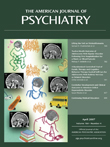A Randomized Controlled Trial of Family Therapy and Cognitive Behavior Therapy Guided Self-Care for Adolescents With Bulimia Nervosa and Related Disorders
Abstract
Objective: To date no trial has focused on the treatment of adolescents with bulimia nervosa. The aim of this study was to compare the efficacy and cost-effectiveness of family therapy and cognitive behavior therapy (CBT) guided self-care in adolescents with bulimia nervosa or eating disorder not otherwise specified. Method: Eighty-five adolescents with bulimia nervosa or eating disorder not otherwise specified were recruited from eating disorder services in the United Kingdom. Participants were randomly assigned to family therapy for bulimia nervosa or individual CBT guided self-care supported by a health professional. The primary outcome measures were abstinence from binge-eating and vomiting, as assessed by interview at end of treatment (6 months) and again at 12 months. Secondary outcome measures included other bulimic symptoms and cost of care. Results: Of the 85 study participants, 41 were assigned to family therapy and 44 to CBT guided self-care. At 6 months, bingeing had undergone a significantly greater reduction in the guided self-care group than in the family therapy group; however, this difference disappeared at 12 months. There were no other differences between groups in behavioral or attitudinal eating disorder symptoms. The direct cost of treatment was lower for guided self-care than for family therapy. The two treatments did not differ in other cost categories. Conclusions: Compared with family therapy, CBT guided self-care has the slight advantage of offering a more rapid reduction of bingeing, lower cost, and greater acceptability for adolescents with bulimia or eating disorder not otherwise specified.



